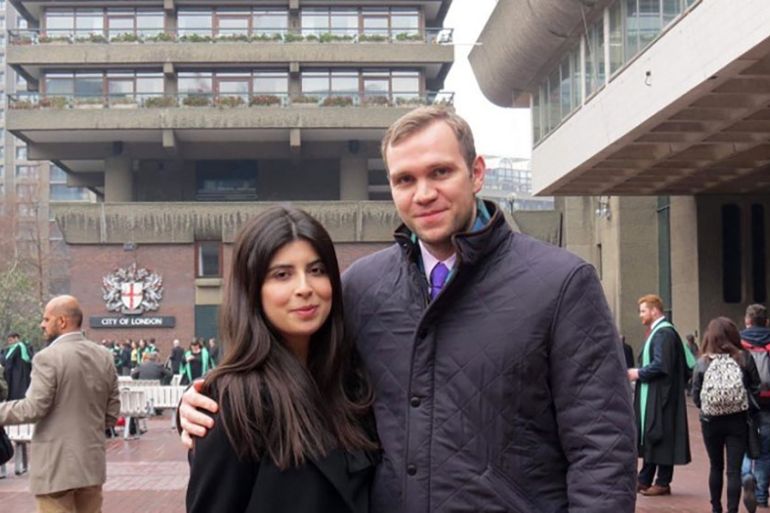UAE releases British scholar Matthew Hedges after pardon
Hedges, who had been sentenced to life in prison, was released on Monday after receiving a presidential pardon.

The United Arab Emirates (UAE) has freed British scholar Matthew Hedges, who was sentenced to life in prison last week for spying.
Hedges, 31, was released on Monday, after he received a presidential pardon, Emirati officials said.
The scholar was among more than 700 people pardoned by the UAE President Khalifa bin Zayed Al Nahyan on Monday, the country’s national day.
The scholar will be permitted to leave the UAE “once formalities are completed”, an official statement said, ahead of his release.
Daniela Tejada, Hedges’ wife, said on Twitter that the pardon was the “best news we could’ve received”.
The presidential pardon for Matt is the best news we could’ve received. Thank you friends, family, media, academics, and the wider public for your undivided support – I’ve been brought back to life. pic.twitter.com/vruok0ST6O
— Daniela Tejada (@dtejadav) November 26, 2018
She also told the BBC that she does not believe her husband is a spy.
“I can’t wait to have him back” and added: “In my heart, I know that he isn’t a spy.”
International pressure
The UAE had come under increasing international pressure since Hedges, a doctoral student in Middle Eastern studies at Durham University in northern England, was handed a life sentence.
He was arrested at Dubai International Airport on May 5 after a two-week research visit.
The UAE signalled on Friday that it was working on an “amicable solution” to the issue, after London described Hedges’ sentence as deeply disappointing.
Emirati officials made a point on Monday to insist that the arrest came on solid ground, showing journalists in Abu Dhabi short video clips of Hedges purportedly acknowledging his intelligence work.
In one video clip, Hedges, is seen describing himself as a captain in MI-6, during what appears to be a court hearing in the Gulf Arab country.
Another clip appears to show Hedges speaking to someone in an office and saying: “It helps the research to go in an easy way.”
Then, Hedges is seen snapping his fingers and adds: “Then it becomes MI-6.”
Emirati officials did not allow journalists to record the video.
“He was a part-time PhD researcher, a part-time businessman, but he was a 100-percent full-time secret service operative,” said Jaber al-Lamki, an official with the UAE’s National Media Council.
“Mr. Hedges has been found guilty of espionage. He sought out sensitive information he knew had access to it. He was here to steal the UAE’s sensitive national security secrets for his paymasters,” al-Lamki added.
The UK’s foreign secretary Jeremy Hunt said on Twitter that the pardon was “fantastic news” and that the UK was “grateful” the issue was resolved.
Fantastic news about Matthew Hedges.Although we didn’t agree with charges we are grateful to UAE govt for resolving issue speedily.But also a bittersweet moment as we remember Nazanin &other innocent ppl detained in Iran.Justice won’t be truly done until they too are safely home.
— Jeremy Hunt (@Jeremy_Hunt) November 26, 2018
In a statement regarding the pardon, the UAE’s foreign minister, Dr Anwar Gargash said: “It was always a UAE hope that this matter would be resolved through the common channels of our longstanding partnership. This was a straightforward matter that became unnecessarily complex despite the UAE’s best efforts.”
The International Campaign for Freedom in the UAE (ICFUAE), meanwhile, said the release of Hedges did not “right the wrong of a grossly unfair trial or of [him] being held for months in solitary confinement without access to legal counsel”.
“Matthew’s ordeal should serve as a wake-up call to the UK government on the realities of repression in the UAE. All future relations with the Gulf state must now be conditional on the Emirati regime’s adherence to international human rights legislation,” the ICFUAE said in a statement.
“Let us not forget the scores of other prisoners of conscience who remain detained in the UAE … it is imperative that his case be understood within this wider climate of repression,” it added.